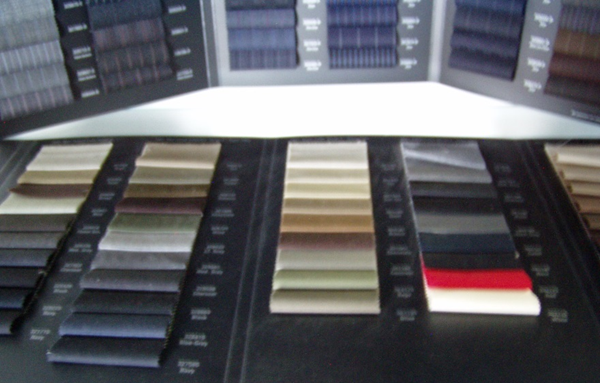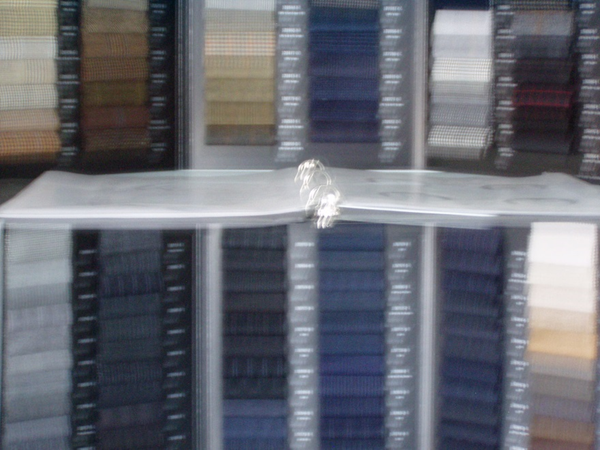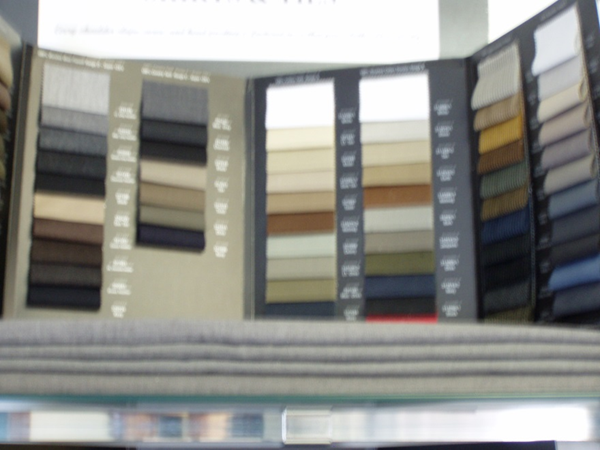FABRIC CHOICES
 |
In our collection, we have 1000’s of samples of materials for you to select from. We even have several bolts of material which we keep in stock. Our collection offers a wide range. Simple and durable to the finest fabrics located from all corners of the globe. |  |
| Using natural fibers provides the best construction for a man’s or woman's well dressed suit. Wool, natural fiber, is the most widely preferred cloth over the other selection of fabric for a durable suit. The characteristics of wool are that it breathes easily and resists wrinkles. Wools hold dyes and can be made into a variety of weaves and weights. Wool is a common fabric for men’s and women’s suits. Worsted, commonly known as woolen yarn, is processed from the wool which is spun tightly to give a stronger smoother feel. |
 |
Types of Wools:
Worsted (woolen yarn) – Top of the line when it comes to woolen suit materials. The mid-weighted corded wools or gabardines are durable and fine for year around. For spring summer and fall the lighter weight wool would be used. This worsted (woolen yarn) has been twisted to produce this finer lighter weight fabric.
Tweed - For the colder climates, the tweed is a popular choice. It is a heavy wool fabric that has a coarse feel to it and is used as a sport coat.
Tropical – These wools are sought for warmer climates due to their lighter weights. These fabrics are preferred in summer attire. Due to the lighter fabric, it is susceptible to more wrinkling so it would not be ideal for an everyday suit.
Herringbone - Its yarns are usually irregular, twisted, and uneven. The cloth is a broken twill weave created by alternating the diagonal pattern within the cloth. This fabric has a zig-zag pattern with a broken weave similar to that of the herring skeleton. This is most commonly used for coats, suits, separates, and sports coats.
Flannel – It can be produced by worsted or woolen yarn. It can be plain or twill weave which produces medium weight fabric. It is the heaviest of the non tweed wool which makes it suitable for winter wear. Since it holds heat, it is not ideal for office environment.
Khaki - A tan colored twill, finer than drill. Name meaning "earth color." Fabric made of cotton, linen, wool, worsted, or manmade fibers and blends.
Other alternative fabrics:
Cotton - After the wool, cotton is chosen as a good alternative because it breathes well. Cotton fabric feels good against the skin regardless of the temperature or the humidity and is therefore in great demand by the consumer.
Linen - Depending on the weight, it’s appropriate for anything from heirloom sewing and blouses to slacks and jackets.
Polyester - A manufactured fiber introduced in the early 1950s, and is second only to cotton in worldwide use. Polyester has high strength (although somewhat lower than nylon), excellent resiliency, and high abrasion resistance. Low absorbency allows the fiber to dry quickly.
MicroFibers - An extremely fine synthetic fiber that can be woven into textiles with the texture and drape of natural-fiber cloth but with enhanced washability, breathability, and water repellancy.
Poplin - A fabric made using a rib variation of the plain weave. The construction is characterized by having a slight ridge effect in one direction, usually the filling. Poplin used to be associated with casual clothing, but as the "world of work" has become more relaxed, this fabric has developed into a staple of men's wardrobes, being used frequently in casual trousers.
Each fabric has its own unique feel, texture, and weight. Kyrou tailoring has samples of each of these for you to see, touch, and feel. Our goal is not just to cloth you, but to help educate you in the art of fabrics.
- << Prev
- Next
